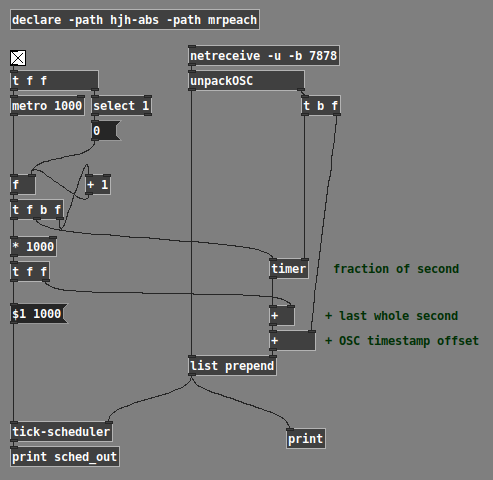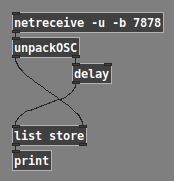As a test case to illustrate what I mean, I'll use SC to generate five messages with randomly shuffled timestamp offsets.
n = NetAddr("127.0.0.1", 57120);
OSCdef(\x, { |msg, time| [time, msg].postln }, '/test');
(
((1..5).scramble * 0.1).do { |offset, i|
n.sendBundle(offset, ['/test', i, offset])
};
)
[ 1487.2653768999, [ /test, 0, 0.10000000149012 ] ]
[ 1487.4653768998, [ /test, 1, 0.30000001192093 ] ]
[ 1487.6653769, [ /test, 2, 0.5 ] ]
[ 1487.3653768999, [ /test, 3, 0.20000000298023 ] ]
[ 1487.5653768999, [ /test, 4, 0.40000000596046 ] ]
The [text sequence] approach I believe would be to add into the [text] repository, subtracting the incoming message time from the last time in the repository and using that as a delta. But in this case, some of the deltas would be negative.
"When is this ever going to happen?" You can't be sure it won't. You could have one thread sending immediate messages (offset = 0) and another thread sending timestamped messages. An immediate message quickly following a timestamped message could have a negative delta.
So you have to be able to handle it.
A priority-queue-based scheduler can do this.

print: 2178.25 /test 0 0.1
print: 2478.18 /test 1 0.4
print: 2378.15 /test 2 0.3
print: 2578.14 /test 3 0.5
print: 2278.13 /test 4 0.2
sched_out: 2178.25 /test 0 0.1
sched_out: 2278.13 /test 4 0.2
sched_out: 2378.15 /test 2 0.3
sched_out: 2478.18 /test 1 0.4
sched_out: 2578.14 /test 3 0.5
The messages are received in index order (0, 1, 2, 3, 4) but come out of the scheduler in time order, with the correct time deltas.
(Also, continually adding to a text repository for [text sequence] would grow but never shrink. [tick-scheduler] does use [text] internally, but reuses rows after they have been output, so memory consumption should be minimal.)
hjh



